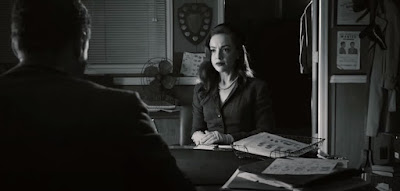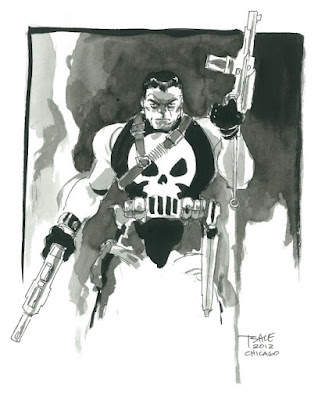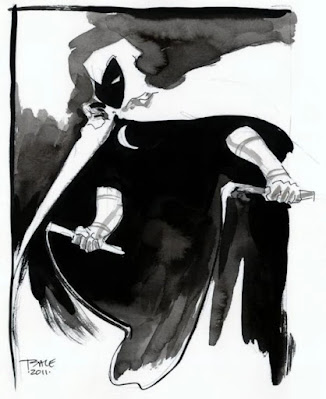Edge of Doom (1950)Starring: Farley Granger, Dana Andrews, Paul Stewart, Robert Keith, Joan Evans, Mala Powers, Howard Vermilyea, Houseley Stevenson, and Adele Jergens
Director: Mark Robson
Rating: Six of Ten Stars
When his devoutly religious, beloved mother dies, Martin (Granger) snaps under the pressure of living life in poverty and murders an elderly priest (Vermilyea) he blames for much of his misery. As he spirals deeper into despair and madness, Martin becomes obsessed with getting enough money to provide his mother with the elaborate funeral he feels she deserves.
"Edge of Doom" had the potential to be one of the bleakest, most depressing, and emotionally impactful films ever made. It takes place almost entirely at night, which is an embodiment of the everpresent gloom in the impoverished inner-city neighborhood in which the story unfolds. The central character is one of the working poor who, despite living an honest life and working hard can't get ahead. There is no way to not feel empathy for him, because circumstances have literally been against him his whole life. The film gets even darker, because those in his life who could possibly stop his downward spiral are either self-interested criminals, trying to keep their own heads above water, or so distracted and/or burned out by the unending cycle misery and social and economic struggles of the neighborhood that they are blind to Martin's meltdown and that they have the ability to stop it.
The villains in this picture aren't any of the characters (although Paul Stewart, in an excellently performed supporting role, comes close to filling that slot)... no, the villains here are Fate, Luck, and perhaps Society. It's rare that a film that a film successfully manages to have ephemeral concepts as the primarily antagonists in a story, but "Edge of Doom" pulls it off. Mostly. Some terrible decisions are made, which I get into below.
The set design, camerawork, and lighting are excellent and all work together to emphasize the unescapable gloom that permeates the neighborhood and infects everybody. Most of the performances are likewise fitting for the characters and situations, with the way the characters are written and how the actors portray them . Even the main police detectives who initially seem to be one-dimensional, dimwitted bully-boys that populated many films of the 1930s and 1940s, end up being portrayed with some nuance, both due to the story and to actors portraying them.
Although Farley Granger does not get top billing, he is the undisputed star of the film. His character is central to almost everything that happens in the picture, and he has more screen time than any other actor. He also delivers a star-caliber performance, even if he goes a little over the top on a couple of occasions. He's not as good here as he is in
"Strangers on a Train" (which he would star in the following year), but it's close.
With all the praise I'm heaping on "Edge of Doom", why is it only getting a Six-Star rating? Well, because someone, somewhere, made the absolutely awful decision to tell the story in flashback, bookending the main story with a sequence featuring Dana Andrews trying to convince a young priest to not quit the parish, because, despite the harsh nature of life there, he has a chance to make a difference if he just sticks with it. This sappy framing sequence not only undermines the dark tone of the story, but it removes any tension that surrounds Andrews' character as the main story unfolds, since we already know how his part in it ends.
The cheesy narration that the flashback structure provides an excuse for, further undermines the tone of the film and brings to the fore what might otherwise have been a preachy under-current. The message that poverty breaks those trapped in in and those who try to get them out of it is delivered clearly enough through the story without the narrator beating us over the head with it. It also undermines Andrews character, since he does seem like a devout, humble and empathetic priest and not a holier-than-thou, preachy one--which is what the voice-over narration borders on. And this is a real shame, because Andrews does a good job with the character otherwise.My dislike of the framing sequence and related narration can't be overstated, and it caused me to knock at least a Star off my rating.
Despite the terrible decision to tell the dark and tragic story of "Edge of Doom" in a flashback sandwiched by a hokey priestly pep talk, I think this is a film that's well worth watching. Farley Granger and Dana Andrews are both very good, and their performances are enhanced by equally remarkable performances from the supporting cast. As mentioned above, Paul Stewart is particularly impressive as Martin's sleazy neighbor. Adele Jergens, as Stewart's wife play a much smaller part, but she is equally remarkable. Both these characters are obviously bad people, but they are portrayed with deftness and nuance by the actors to the point where the viewers can actually find them somewhat sympathetic.
If you are an Amazon Prime subscriber, "Edge of Doom" is, as of this writing, one of the films you can watch for free.
Click here to check it out.
















































.jpg)







.jpg)
